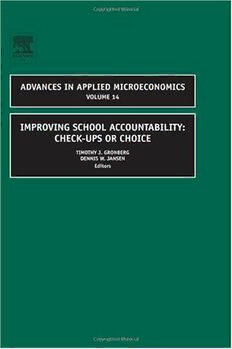
Improving School Accountability: Check-Ups or Choice, Volume 14 PDF
282 Pages·2006·2.427 MB·English
Most books are stored in the elastic cloud where traffic is expensive. For this reason, we have a limit on daily download.
Preview Improving School Accountability: Check-Ups or Choice, Volume 14
Description:
This volume brings together ten papers by outstanding researchers who tackle important economic issues surrounding school accountability reforms. The existing state of K-12 public education in the United States is perceived as unacceptable by a large number and wide variety of critics. How to improve upon this state is the subject of much disagreement. The public discussion is heated, and even the academic debate is often sharp. One common thread of argument stresses the need to increase accountability as a strategy for improving public school quality. There are two broad mechanisms for increasing accountability. If current outcomes are too low, then setting acceptable performance standards is one approach to generating quality improvements. The task becomes one of defining appropriate accountability standards and establishing a system of incentives to implement those standards. Alternatively, the low current performance may reflect weak productivity incentives traceable to the limited competition which many school operators face. The suggested remedy is a dose of increased choice, either increased public sector offerings such as charter schools or increased private sector choice via voucher-type programs. The papers in this volume employ relevant microeconomic analysis and current econometric techniques to better our understanding of these vital economic and public policy issues.
See more
The list of books you might like
Most books are stored in the elastic cloud where traffic is expensive. For this reason, we have a limit on daily download.
